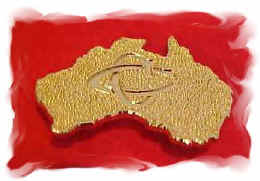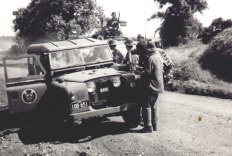In 1936 a group of
businessmen and Christian laymen in Melbourne and Sydney became known as
Campaigners for Christ. The Melbourne group gained permission to erect a
building in the Royal Melbourne Showgrounds. From there they provided
light refreshments, Christian entertainment and witness.

|
At the outbreak of the Second World
War the Showgrounds were converted to a RAAF transit camp and school.
Campaigners for Christ approached the Military authorities and requested
permission to staff their building an provide a service to the young
airmen. This was the only work undertaken with the RAAF as a sole
service. |
About the same time, one of the
foundation members of Campaigners for Christ, Leonard Buck, purchased
and fitted out a mobile van. Somehow he gained permission to go to the
Malay peninsular to provide comforts, literature and Christian witness
to RAF, British and Australian personnel.
As the Japanese advanced down the
peninsular, Buck fell back with the Allied Forces to Singapore. Together
with his vehicle, he was loaded on the 'Empire Star', one of the last
ships to leave Singapore Harbour. He accompanied the RAF Headquarters to
Java, and from there sailed to Perth, where he was interviewed by the
Secretary for War, Frank Sinclair.
At the time of the retreat from
Singapore, two other men were enroute to join him and were redirected to
Darwin. They were in the process of building a centre in Smith St when
the site was bombed by the first Japanese attacks on that City. With the
mass evacuation of the City, service personnel were at a premium and the
two Everyman's staff members were seconded to supervises a train load of
women and children to Melbourne. Alec Gilchrist told of ringing ahead to
Adelaide, telling of the coming trainload of families. In Adelaide they
were refused permission to leave the train and so local churches brought
food and drink to the women and children at the railway station.
Meanwhile, in Perth, Len Buck was
given a Mayoral reception at the Town Hall, and enthused the public with
his vision of how they could serve the men and women of the Australian
Services. Crowds packed the Town Hall, and this was repeated in
Adelaide, Melbourne, Sydney, Brisbane and Townsville.
Not long after, Len Buck and several
others, journeyed from Melbourne to Albury where they met Brigadier
Blake and investigated establishing a Recreation Centre at the soon to
be opened Bonegilla camp, 15Km east of Wodonga, Victoria. It was at the
Bonegilla camp where the first 'Everyman's Hut' was built to serve the
Army, (The name 'Everyman's' being derived from the Biblical reference
of Colossians 1:28.)
From these beginnings Everyman's
spread rapidly to many locations around Australia, including an
Everywomen's Hut at Bandiana, 5 km from Wodonga, staffed by women. Tea
rooms were also established in capital cities. The Huts were staffed by
ministers of religion, missionaries who had returned to Australia due to
the war, and countless civilian men and women volunteers. Everyman's
staff wore a Military cut uniform, of a grey-pink colour and were given
Officer status by the local Commanders.
The Huts were largely identical in
nature: comforts and entertainments were offered to the soldiers,
offering a 'home away from home' atmosphere. They were open long hours
each day; at this stage the uniformed staff lived in sleeping quarters
in the Hut. From here friendly counsel and encouragement was given, both
around the camps and out in the field during exercises. The Huts tea
rooms were funded by donations from Servicemen and women, funds raised
through Len Buck's tours, and the Christian public, as well as many of
the staff contributing their own allowances.
Following the Second World War, many
of the staff returned to their previous employment. However, at a number
of camps the Huts remained open and offered the same services to the
troops as before. Around 1946 arrangements were undertaken to formally
recognise the services of organisations who assisted the Military Forces
and official Accreditation was offered to the Red Cross, Salvation Army,
YMCA/YWCA, Australian Forces Overseas Fund and Campaigners for Christ.
Officer status was officially conferred on the staff members and special
Rank insignia was worn.
 |
Everyman's continued to serve during
two national Service call-ups, the longest continuous Centre being at
Kapooka, which was established in 1953 when the camp was an Engineer
Depot. It still operates today. Welfare Representatives have served
overseas in Malaya, Singapore and Vietnam (see
photo), Cambodia, and more recently
in East Timor. Three staff members have been awarded Australian Honours
for service with Everyman's. |
n 1977 the Everyman's Reserve was
formed. Volunteers from churches and Bible Colleges, are trained to
assist and relieve the full-time staff as available. This allows staff
to undertake deputation programmes, take annual leave and ensure Bases
are manned when staff are on exercise.
n 1991 the Chief Commissioner of
Everyman's, Stacey Kruck, OBE OAM, hosted a dinner at Victoria Barracks,
Sydney, to mark the Jubilee year of the Organisation. Special Guests
included the Chief of the General Staff, LTGEN John Coates, AO, MBE and Mrs.
Coates and CCOM L E Buck, AM (Rtd), the Patron of Everyman's. At the
dinner 50 Jubilee medals were struck and presented to individuals to
mark their valuable contribution to the work. Also presented were nine
Service Medals, recognising at least 10 years full-time service.
Everyman's operates Recreation Centres
at a number of Military Bases around Australia. Support is given to
units on exercise and when Australian Forces are called to serve on
operations. In anticipation of the general move of the Defence Force to
northern areas of Australia, the Headquarters of Everyman's was
established in Brisbane, Qld in January 1991.
In 1999 the RAAF requested
philanthropic support on its Darwin Base which accommodated a transit
camp during INTERFET and UNTAET in East Timor. This is the first Centre
to open on a RAAF Base since World War II. Limited services are given in
support of RAAF Amberley (Qld) units during field exercises. |